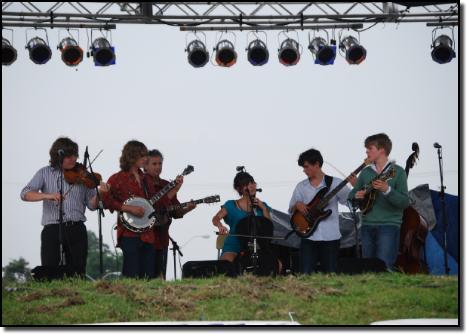|
|
|
|
|
|
|
|
|

Mentoring Program
The National Fiddler Hall of Fame
|
Mentoring Program: Rockin' Acoustic Circus
Circus Kids
By: Beth Clary
Rick Morton lived many lives before 2006. A multi-instrumentalist, Rick garnered recognitions on mandolin, fiddle and guitar as a solo player as well as playing with Ronnie Brooks, Ricky Scaggs, The Tractors, to name a few. While music remained a major part of his life through teaching and performing, Rick also had a challenging and fulfilling career as a firefighter. But when he could see his option to retire from the fire department on the horizon, Rick started thinking about how to transition back to playing more music.
“I started talking to different people about maybe forming a country duo or band,” Rick said recently. “Meanwhile, I started getting some of my long-time music students together to play.”
Some of those students participated in the National Fiddler Hall of Fame pilot education project, “Oklahoma Stomp!” Rick and Education Director Shelby Eicher gathered a group of talented young players to learn and perform Western Swing music. (See Oklahoma Stomp! Article) Three of those players – Sterling Abernathy , a 16-year-old mandolinist, Eric Dysart, a 17-year-old fiddle player and singer who has been a long-time student of Rick’s, and, Zac Hardin, a 15-year-old string bass player – moved from the Oklahoma Stomp experience to what today is a 6-piece ensemble of five young musicians and Rick who have a distinctive sound and musical style.
 Originally a band with fewer members and a female lead vocalist, Emily Dale, now the Rockin’ Acoustic Circus includes banjo player, Carson Clemishire, 16, who joined the band in 2006, and Zac’s sister, Emma Hardin, a 17-year-old cellist and singer, who joined in 2007.
Originally a band with fewer members and a female lead vocalist, Emily Dale, now the Rockin’ Acoustic Circus includes banjo player, Carson Clemishire, 16, who joined the band in 2006, and Zac’s sister, Emma Hardin, a 17-year-old cellist and singer, who joined in 2007.
For the last year-and-a-half, these five teens have completely rearranged their lives to make their music and the band the centerpiece of their lives. They are all home-schooled, using various online teaching options, and they put in both solo practice and lesson time as well as band sessions, averaging “probably at least 3 hours each day,” offered Carson.
“These kids wanted to make some sacrifices and go to the next level,” says Rick. “The goal is to take it a step at a time. I can guarantee a year from now things will be different for each of them and the band. The learning curve now is huge.”
The types of learning that come with being in the band have been an on-going education as well. Rick explains that his job includes not just instruction on the various instruments in the band, but helping the players know the roots of the music they’re playing. “I tell them ‘know blue grass before you start playing new grass. So listen to your musical heroes, really listen and learn what they played and how they played.’ It’s the long way to go but with hard work and patience, the pay off will come.”
The musical education also includes helping make arrangements of songs; playing rhythm guitar to keep the tempos steady and being the glue that keeps the band musically together. “Learning how to play as a group and what to play, musically and personally, is part of what I help them understand too.” For this, as well as theory, improvisational techniques and more, Rick relies on musical friends. His long-time friend, musician and songwriter, Ronnie Wiggins, was a huge part of the band. Wiggins died in 2008 after battling cancer, but his impact on the band continues to this day. “Ronnie was pretty sick and still he came to a show to help with sound. The kids are learning songs he wrote…he had a big impact on this band,” said Rick. He quickly followed with a long list of ways that his other musical friend, Shelby Eicher, has helped the band. “Shelby has been a with the band from the early days, helping with arrangements, workshops and improv techniques. He even named the band. We recorded at his house and after he finished mixing the tracks and putting it on CD he handed it to me and said, ‘Here’s your mix’ and it read: ‘Mamba Jamba by Rockin’ Acoustic Circus.’”
Morton also holds parent meetings. “These kids have parents and grandparents who have made sacrifices in the way they live their lives so that these kids can do this.” He urges these parents to be as active with the band life as they can. “But I tell them, do NOT drag your kids’ stuff around for them, or help with set-up or tear-down. That’s the work the band needs to do.”
“You know,” Morton reflected recently, “this band is like a family. So I end up navigating conflict. If something’s not working, they of course want to know why – now. So I try to encourage some healthy discussion and help figure what’s working and what’s not working so that practices can be about the music.”
As the Circus has garnered more attention on regional and national levels, Rick has had to help the kids to stay focused and remain balanced. “The kids each have individual musical interests that don’t necessarily involve the band. Emma and Zac are pursuing classical music as well, for instance. And some of the kids went to Mark O’Connor’s camp while others went to different camps and contests. So when we decided to sign with Class Act, a full-service booking agency, I said to the band that I wasn’t willing to do a show every weekend. I needed to say that for me, as well as for them.”
So for the last 18 months, these five energetic and enthusiastic teenagers have been influenced in more ways than even they may realize by Rick Morton. In November, they played a sold-out concert opening for “The Green Cards” at the All Souls Acoustic Coffeehouse in Tulsa; they release their third CD – Lonestar Lullaby - at the end of January 2010; and, while they may not play shows every weekend, their performance calendar is filling up many months out. They’ve also learned about their musical strengths, both individually and collectively. They’ve learned how to say good-bye to a dear friend and keep his spirit alive through music, even his music. They’ve learned how to work through conflict and still come out playing their best. When asked for the top things he hopes he’s taught these teens, Rick says:
Learn it the right way – with practice you can learn almost any skill, just do it right from the start
- Don’t take short cuts
- Respect and appreciate the people who are playing with you and supporting you
- If you desire something, let people know and work towards it
- Have fun!
“I’m doing something I never dreamed of doing,” concluded Morton. “We’ve all put our hearts into this and gotten a lot out of it. This is my band…but if it all stopped today, I’d be okay. I have to say it’s been an experience…maybe the kind of experience where only music can take you.”
Rockin Acoustic Circus Website: www.rockinacousticcircus.com
